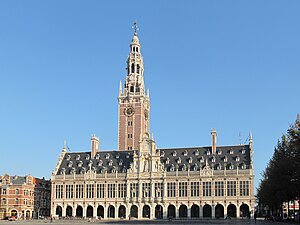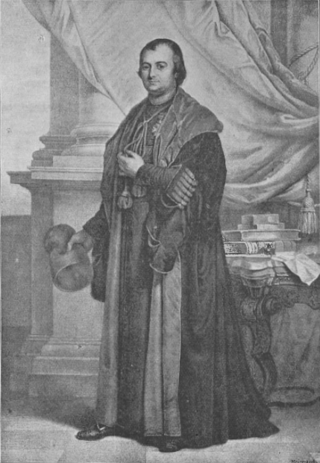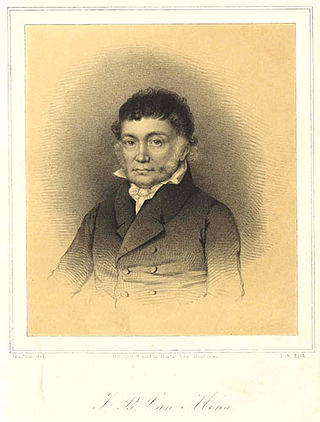
The city of Leuven in Belgium was the seat of three successive universities, each of which had a notable academic library.

The city of Leuven in Belgium was the seat of three successive universities, each of which had a notable academic library.
The Old University of Leuven founded in 1425 had a collegiate structure with no central library. Students probably had access to manuscripts and printed books preserved in their colleges, in stationers' offices, and in the homes of their professors. With the bequests to the university of the libraries of Laurentius Beyerlinck, a canon of Antwerp Cathedral, in 1627, and of Professor of Medicine Jacobus Romanus in 1637, a central library was established in the University Hall, [1] under the management of the jurist and historian Valerius Andreas. [2]
In 1797, the manuscripts and most valuable works were seized by the French state and transported partly to the National Library of France in Paris and partly to the Central School of Brussels. [3] The library of the Central School of Brussels had about 80,000 volumes, which eventually passed into the possession of the City of Brussels and then the Royal Library of Belgium. Similarly, the rich archives of the Old University are now held by the National Archives of Belgium.
It is also very likely that during the troubles of the wars of the French Revolution many books and valuable documents were removed from the collection. Several libraries across Europe now have books and manuscripts that certainly came from Leuven University Library, such as the founding charter of 1425 which was located in 1909 at the seminary of 's-Hertogenbosch, or the courses of the law professor Henricus de Piro which were located in the late 20th century in the National Széchényi Library in Budapest.
The State University of Leuven, founded in 1817, also established a library. In 1826 the librarian was Karl Bernhardi. He was succeeded by P. Namur.
The nucleus of its collection was formed by the works of the municipal library of Leuven that the city offered the State University in 1817. In addition, the State University received from the government of the Netherlands the sum of 20,000 guilders to enrich its book funds.


This library was established in Mechelen at the very beginning of the Catholic University of Belgium in 1834. In 1835 the Catholic University of Mechelen moved to Leuven and became the Catholic University of Leuven, with a leasehold on the University Hall, where the library was again kept until 1914.
This library was burned by German soldiers at the beginning of the First World War, destroying approximately 230,000 books, 950 manuscripts, and 800 incunabula. [1]
After the First World War a new purpose-built library was erected on the Ladeuzeplein in a building of neo-Flemish-Renaissance style, designed by the American architect Whitney Warren and built between 1921 and 1928. The library's book collection was rebuilt with donations from all around the world which had been outraged by the act from which it had suffered
The library burned again in 1940, probably following exchanges of fire between belligerents.
The library was again restored and holds approximately four million books. Since 1970 the collections have been divided between the French-speaking Université catholique de Louvain and Dutch-speaking Katholieke Universiteit Leuven.
The University Library of the Catholic University of Leuven has acquired not only modern books but also many old books and valuable incunabula.

Leuven or Louvain is the capital and largest city of the province of Flemish Brabant in the Flemish Region of Belgium. It is located about 25 kilometres east of Brussels. The municipality itself comprises the sub-municipalities of Heverlee, Kessel-Lo, Leuven proper, Wilsele, Wijgmaal and part of Haasrode and Korbeek-Lo. It is the eighth largest city in Belgium, with more than 100,244 inhabitants.

The Catholic University of Leuven or Louvain was founded in 1834 in Mechelen as the Catholic University of Belgium, and moved its seat to the town of Leuven in 1835, changing its name to Catholic University of Leuven. In 1968, it was split into two universities, the Katholieke Universiteit Leuven and the Université catholique de Louvain, following tensions between the Dutch and French-speaking student bodies.

Louvain-la-Neuve is a planned town in the municipality of Ottignies-Louvain-la-Neuve, Wallonia, Belgium, situated 30 km southeast of Brussels, in the province of Walloon Brabant. The town was built to house the Université catholique de Louvain (UCLouvain) which owns the entire territory of the town; following the linguistic quarrels that took place in Belgium during the 1960s, and Flemish claims of discrimination at the Catholic University of Leuven, the institution was split into the Dutch language Katholieke Universiteit Leuven, which remained in Leuven, and the Université catholique de Louvain.
University of Leuven or University of Louvain may refer to:

The Free University of Brussels was a university in Brussels, Belgium. Founded in 1834 on the principle of "free inquiry", its founders envisaged the institution as a free-thinker reaction to the traditional dominance of Catholicism in Belgian education. The institution was avowedly secular and particularly associated with Liberal political movements during the era of pillarisation. The Free University was one of Belgium's major universities, together with the Catholic University of Leuven and the state universities of Liège and Ghent.

UCLouvain or Université catholique de Louvain is Belgium's largest French-speaking university. It is located in Louvain-la-Neuve, which was expressly built to house the university, and Brussels, Charleroi, Mons, Tournai and Namur. Since September 2018, the university has used the branding UCLouvain, replacing the acronym UCL, following a merger with Saint-Louis University, Brussels.

Pierre François Xavier de Ram, was a Belgian papal prelate, canon and historian, best known for being the first rector of the new Catholic University of Belgium, founded in Mechelen in 1834, which in 1835 moved to Leuven as the Catholic University of Leuven.
The Belgian American Educational Foundation (BAEF) is an educational charity. It supports the exchange of university students, scientists and scholars between the United States and Belgium. The foundation fosters the higher education of deserving Belgians and Americans through its exchange-fellowship program. Since 1977, Dr. Emile Boulpaep is the president of the BAEF.
Science and technology in Flanders, being the Flemish Community and more specifically the northern region of Belgium (Europe), is well developed with the presence of several universities and research institutes. These are strongly spread over all Flemish cities, from Kortrijk and Bruges in the Western side, over Ghent as a major university center alongside Antwerp, Brussels and Leuven to Hasselt and Diepenbeek in the Eastern side.

UCLouvain Saint-Louis Brussels is an autonomous university campus specialized in social and human sciences part of UCLouvain and based in Brussels, Belgium.
Science and technology in Brussels, the central region of Belgium (Europe), is well developed with the presence of several universities and research institutes.

The Leuven Faculty of Theology was a branch of the Catholic University of Leuven, founded in 1834 in Mechelen by the bishops of Belgium as the Catholic University of Belgium, that moved its seat to the town of Leuven in 1835, changing its name to Catholic University of Leuven.

The State University of Leuven was a university founded in 1817 in Leuven in Belgium, then part of the United Kingdom of the Netherlands. It was distinct from the Old University of Leuven (1425-1797) and from the Catholic University of Leuven, founded in 1834, which moved from Mechlin to Leuven after the State University had been closed in 1835.

The Old University of Leuven is the name historians give to the university, or studium generale, founded in Leuven, Brabant, in 1425. The university was closed in 1797, a week after the cession to the French Republic of the Austrian Netherlands and the principality of Liège by the Treaty of Campo Formio.
The city of Leuven, in the former Duchy of Brabant, has been the seat of four universities:

KU Leuven is a Catholic research university in the city of Leuven, Belgium.
The following is a timeline of the history of the municipality of Leuven, Belgium.

The Catholic University of Leuven was one of Belgium's major universities. It split along linguistic lines after a period of civil unrest in 1967–68 commonly known as the Leuven Affair in French and Flemish Leuven, based on a contemporary slogan, in Dutch. The crisis shook Belgian politics and led to the fall of the government of Paul Vanden Boeynants. It marked an escalation of the linguistic tension in Belgium after World War II and had lasting consequences for other bilingual institutions in Belgium within higher education and politics alike. In 1970 the first of several state reforms occurred, marking the start of Belgium's transition to a federal state.
50°52′41″N4°42′27″E / 50.87806°N 4.70750°E